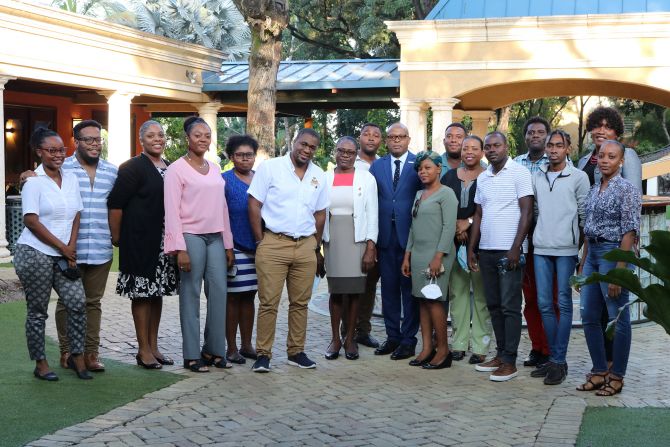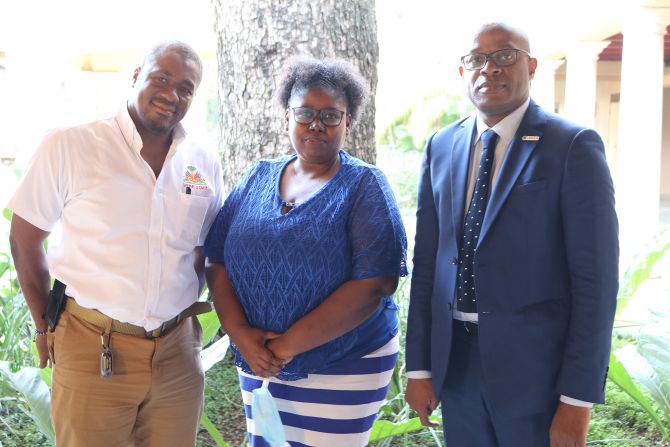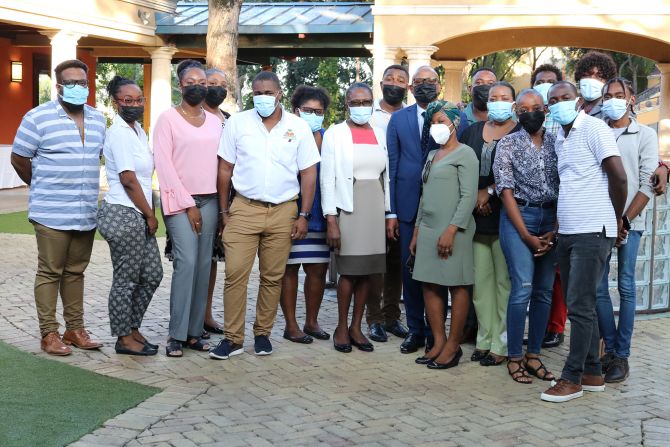



Feature Story
Strengthening Haiti’s HIV response through community-led monitoring
03 December 2021
03 December 2021 03 December 2021“I have not been taking my meds for seven months,” said Carla Joseph (not her real name), a transgender woman living with HIV in Haiti. “I need a reliable, direct place that will not ask me for a referral letter … to get back into care.”
She is speaking to one of Haiti’s community-led monitoring (CLM) field officers from the Civil Society Forum Observatory, who over the past year have been working to learn more about how to connect diagnosed people to treatment and ensure that those already in care are better served.
“During the monitoring we met many clients waiting for their turn to be consulted and get their drug refilled,” said Elisabeth Jacques, a Community-Led Monitoring Field Coordinator. “Shouldn’t the services be at the best day and time for the patient?”
UNAIDS is supporting the community-led monitoring work being conducted by Haiti’s Civil Society Forum Observatory. Community-led monitoring is an accountability mechanism to improve people’s access to HIV services and the quality of care they experience. The process is led and implemented by communities of people living with HIV, key populations and other vulnerable groups.
This initiative is part of a coordinated effort by partners, including the Ministry of Public Health and Population and the United States Government through the United States President’s Emergency Plan for AIDS Relief (PEPFAR). It aims to maintain and expand access to HIV services for Haiti’s estimated 150 000 people living with HIV, including 30 000 who are not yet aware of their status.
In its first report, the Civil Society Forum Observatory called attention to the need to improve client-centred services by extending service hours and reducing waiting times. It has also recommended an increase to six months for the supply of antiretroviral medicines dispensed to stable people living with HIV. Additionally, the community-led monitoring exercise unearthed a need to improve treatment literacy related to the concept of U = U (undetectable = untransmittable).
“We should build the capacity of civil society to do this sensitization work. They are more familiar with the clients. When someone is lost to follow-up, community members know how to speak to them and encourage them to come back. If we empower the community through community-led monitoring we can have a better handle of what’s going on,” said Soeurette Policar, the Coordinator of the Civil Society Forum Observatory.
The Head of HIV Prevention at the Ministry of Public Health and Population, Steve Mc Allan Smith, welcomed the recommendations. “Community-led monitoring will tell us how services are being rendered in the community and how people are experiencing those services from a client perspective. This approach will tell us how to tailor interventions to the specific needs of the patients. It will also help us address testing issues. But mostly it will help us retain people in care. Reaching the targets is really good,” he said. “But maintaining them long-term is what we are going for.”
Over the past year, the country has contended with intersecting crises. One month after the assassination of its president, Haiti endured a devastating earthquake, followed by a tropical storm. Worsening organized crime and an epidemic of kidnappings have had dire implications for the daily life of Haitians. In recent months a fuel shortage has made it even more difficult for people and organizations to conduct their affairs. And all this under the spectre of COVID-19.
Poverty, gender-based violence and the discrimination faced by people living with HIV and key population communities undermine people’s ability to stay on treatment. The challenging socioeconomic and security context only makes things worse. According to PEPFAR data, almost 8000 Haitians came off HIV treatment last year.
However, as the UNAIDS Country Director for Haiti, Christian Mouala, noted, Haiti was able to successfully implement multimonth dispensing of antiretroviral medicines to 88% of people on HIV treatment during COVID-19. This was thanks to coordinated efforts under the leadership of the Ministry of Public Health and Population and the collaboration of many stakeholders, including Haitian civil society.
“The people and health system here are resilient and adaptable,” Mr Mouala said. “At this time community leadership must become even more central to developing and implementing strategies to ensure people enjoy the best possible HIV, health and social support services.”



